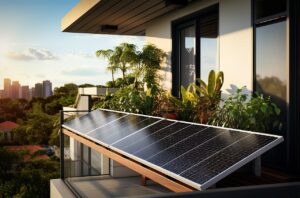The Balcony Power Station As A Sustainable Energy Source In Your Own Home

Balcony power stations are a good approach. In an age of rising energy prices and growing environmental awareness, more and more households are looking for ways to generate their own electricity in an environmentally friendly way.
The use of balcony power stations is a concept that has become increasingly popular in recent years. These mini solar power plants allow tenants to produce renewable energy directly on their balconies. In an exclusive guest article, Patrick Willemer Patrick Willemer reports on the topic and provides valuable tips
How landlords can benefit from balcony power stations
A tenant’s decision to install a such a power plant can present a unique opportunity for landlords. From increasing the appeal of their properties to environmentally conscious tenants to potential tax benefits. The trend towards sustainable living is on the rise and balcony power plants could become a key differentiator for landlords.
Properties that are already equipped with environmentally friendly technologies are becoming more attractive. The installation of balcony power plants can not only arouse the interest of potential tenants, but also have a positive impact on rental prices. Landlords could also benefit from various government subsidy programs that support the use of renewable energies in residential buildings. These financial incentives could not only cover the costs of installing balcony power plants, but also mean an additional profit for landlords..
Balcony power plants in urban areas: challenges and opportunities
While balcony power stations are undoubtedly an innovative concept for decentralized energy generation, they are not without their challenges. Their integration into densely populated urban areas brings with it architectural and urban planning considerations. Questions of aesthetics and integration into the cityscape are just as important as technical considerations regarding grid stability and optimal utilization of solar energy.
Another aspect is possible conflicts of interest between tenants and landlords when it comes to the use of such technologies. Clear agreements and transparent communication can contribute to the successful implementation of balcony power plants in urban areas.
Energy transition with balcony power plants
Such concepts could be more than just a local solution. In this article, we explore the potential of these mini solar power plants to revolutionize the energy market. From the creation of decentralized energy communities to integration into smart grid systems, we show how balcony power plants could play a crucial role in the future energy supply.
Decentralized energy generation through balcony power plants could play a key role in the implementation of a sustainable energy transition. By supplying not just individual apartments, but entire residential complexes, they create the opportunity to form local energy communities. These communities could share surplus energy with each other, enabling efficient use and reducing dependence on central energy suppliers. In addition, balcony power plants could function as part of smart grid systems that dynamically adjust energy consumption and thus help to stabilize the overall grid.
The future of mini solar power stations
Expert Patrick Willemer sees them as a key contribution to the energy transition. In his opinion, future developments in solar technology could further increase the efficiency of balcony power plants and make their implementation in urban areas even more attractive. The integration of energy storage solutions could also ensure a continuous energy supply, even when the sun is not shining. Technological advancements and the increasing acceptance of such green technologies could make balcony power plants a standard part of urban living.
Conclusion: Balcony power plants as the key to a sustainable energy future
Their use could not only increase each tenant’s individual contribution to sustainable energy generation, but also revolutionize the entire energy landscape of urban areas. In our conclusion, we summarize the most important findings and show why balcony power plants could be a decisive key to a sustainable energy future.
Overall, such systems not only offer a local, environmentally friendly source of energy, but could also contribute to a decentralized energy transition. While the challenges in terms of architecture, urban planning and social acceptance need to be considered, the potential benefits for landlords, tenants and society as a whole cannot be overlooked. If the integration of balcony power plants is successfully driven forward, they could promote a sustainable and efficient energy future by playing a significant role both on an individual level and as part of larger urban energy strategies.

C&C Autor aus Hamburg
Patrick Willemer ist ein erfahrener Experte im Bereich erneuerbare Energien und der Solarindustrie. Im Dezember 2021 gründete er die Solarfirma “EPP Energy Peak Power GmbH”, die sich auf hochwertige Produkte aus der Photovoltaik-Branche mit Fokus auf Balkonkraftwerke spezialisiert hat. Das Unternehmen verzeichnet seitdem kontinuierliche Erfolge und Wachstum dank des engagierten Teams, das sich für erstklassige Qualität und Kundenservice einsetzt. Neben seiner beruflichen Tätigkeit engagiert sich Patrick Willemer für soziale Projekte, besonders für die Bildung benachteiligter Kinder in Indien. Seine Leidenschaft für eine nachhaltigere Zukunft spiegelt sich in seiner Vision für die Förderung erneuerbarer Energien und des Umweltschutzes wider.



